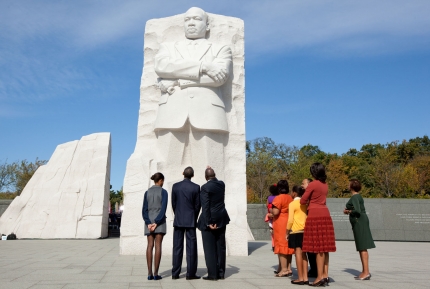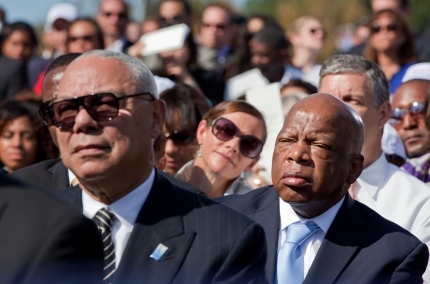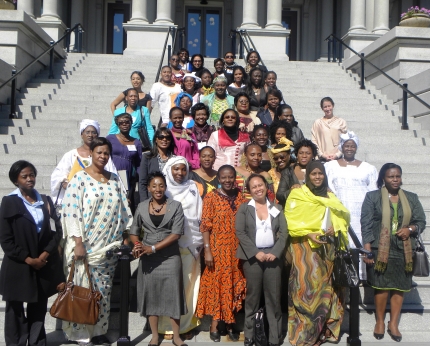Blog Posts Related to the African American Community
The Legacy of the 1961 Freedom Rides
Posted by on October 18, 2011 at 9:12 AM ESTOn Wednesday, October 19, law students, participants in the civil rights movement, and others will gather at the White House for a screening of Freedom Riders and a panel discussion of the legal legacy of the 1961 Freedom Rides. The screening is part of National Endowment for the Humanities’ (NEH) “Bridging Cultures through Law” film series.
NEH is proud to have funded Freedom Riders, which recently won three Emmy® Awards. The film chronicles the inspirational story of how more than four hundred black and white Americans challenged Jim Crow laws in the Deep South through nonviolent action and created great change. Their courage in the face of coercive abuse helped lead to the end of segregation on buses and trains and in public facilities. Produced by Stanley Nelson and Laurens Grant, and based on Raymond Arsenault’s 2006 book, Freedom Riders: 1961 and the Struggle for Racial Justice, Freedom Riders premiered on PBS’s American Experience.
The film screening will be followed by a panel discussion with Raymond Arsenault (the author), Diane Nash (the lead organizer of the Freedom Riders), and John Seigenthaler (an assistant to Attorney General Robert Kennedy). The discussion will also draw on the experiences of seven other Freedom Riders who will be in the audience, as well as students who recently recreated the bus journey taken by the Freedom Riders this past spring.
The panel discussion is sure to be lively and thought-provoking. It will be streamed live on Wednesday at 5 p.m. EDT at WhiteHouse.gov/Live.
Learn more about Civil RightsPresident Obama at the Martin Luther King, Jr. Memorial Dedication: "We Will Overcome"
Posted by on October 16, 2011 at 7:48 PM ESTToday, nearly half a century after Martin Luther King, Jr. led the historic March on Washington for equality, tens of thousands came to the National Mall in Washington, D.C. for the Martin Luther King, Jr. Memorial Dedication. The memorial to Dr. King has been open since August, but the dedication was delayed due to Hurricane Irene. As President Obama said, though delayed, "this is a day that would not be denied."
President Obama, joined by the First Family, toured the memorial and then spoke at the dedication ceremony in honor of Dr. King's work to make his dream a reality for all. During his speech, President Obama reminded us that the progress towards Dr. King's vision has not come easily and there is still more to do to expand opportunity and make our nation more just:
Our work is not done. And so on this day, in which we celebrate a man and a movement that did so much for this country, let us draw strength from those earlier struggles. First and foremost, let us remember that change has never been quick. Change has never been simple, or without controversy. Change depends on persistence. Change requires determination. It took a full decade before the moral guidance of Brown v. Board of Education was translated into the enforcement measures of the Civil Rights Act and the Voting Rights Act, but those 10 long years did not lead Dr. King to give up. He kept on pushing, he kept on speaking, he kept on marching until change finally came.
And then when, even after the Civil Rights Act and the Voting Rights Act passed, African Americans still found themselves trapped in pockets of poverty across the country, Dr. King didn’t say those laws were a failure; he didn’t say this is too hard; he didn’t say, let’s settle for what we got and go home. Instead he said, let’s take those victories and broaden our mission to achieve not just civil and political equality but also economic justice; let’s fight for a living wage and better schools and jobs for all who are willing to work. In other words, when met with hardship, when confronting disappointment, Dr. King refused to accept what he called the “isness” of today. He kept pushing towards the “oughtness” of tomorrow.
And so, as we think about all the work that we must do –- rebuilding an economy that can compete on a global stage, and fixing our schools so that every child -- not just some, but every child -- gets a world-class education, and making sure that our health care system is affordable and accessible to all, and that our economic system is one in which everybody gets a fair shake and everybody does their fair share, let us not be trapped by what is. We can’t be discouraged by what is. We’ve got to keep pushing for what ought to be, the America we ought to leave to our children, mindful that the hardships we face are nothing compared to those Dr. King and his fellow marchers faced 50 years ago, and that if we maintain our faith, in ourselves and in the possibilities of this nation, there is no challenge we cannot surmount.
Blog Action Day: Highlighting the Devastating Crisis in the Horn of Africa
Posted by on October 16, 2011 at 10:20 AM ESTEd note: As part of Blog Action Day, the White House's Courtney O'Donnell, who traveled to refugee camps in Kenya this summer with Dr Jill Biden, reflects on how we can all make a difference in the lives of those suffering in the Horn of Africa.
Blog Action Day and World Food Day provide an opportunity for individuals all over the world to spark collective action around the pressing global issue of food. This is particularly important now, as drought in the Horn of Africa and famine in parts of Somalia threaten millions.
Tragically, the worst drought in 60 years is being complicated by a chaotic political situation in Somalia. People are facing not only hunger, but also terrorism and violence.In August, I traveled to Kenya along with my boss, Dr. Jill Biden and several other U.S. officials to visit the to the largest refugee camp in the world, in Dadaab, Kenya, where nearly 1,300 people arrive every day. We met with families who had walked for days or weeks, often barefoot, with no possessions, desperate to find food and medical care.
We spent time with a mother who had walked for over two weeks with her malnourished children to get to the camp. Her baby was sick with diarrhea; an ailment that seems minor to many of us but in these circumstances could be fatal. Like many of the women in the camps, this mother had walked day and night, through very dangerous conditions to try to save her children.
Learn more about Foreign PolicyThe King Memorial: A Symbol of the Best in America
Posted by on October 16, 2011 at 10:08 AM ESTOn August 28, 1963, the day of the March on Washington, all of the platform speakers were invited to the White House to meet with President John F. Kennedy. A few months earlier I had made my very first trip to the White House. I was only 23-years-old and also the brand-new chairman of the Student Non-Violent Coordinating Committee. It was amazing. A week into my new job I was headed to the White House to meet President Kennedy.
I was with five other great men, including Martin Luther King Jr., Roy Wilkins, James Farmer, and Whitney Young, known as the Big Six leaders of the movement. There were many women who were instrumental to our plans to march and many heroines of the movement, including Coretta Scott King, Fannie Lou Hamer, Dorothy Height, Ella Baker and Diane Nash. However, as was customary in those times, none of them were in the room that day. We told President Kennedy the people could not wait any longer. We were planning to call on thousands to march on Washington.
President Kennedy was visibly concerned. He was sitting in the Oval Office in his rocking chair, and he began to rock a little more briskly. He was concerned about violence. He wanted to cool down rising tensions, but A. Philip Randolph, the founder of the Brotherhood of Pullman Car Porters, the dean of our movement, and the visionary behind the march assured him this would be a lawful, peaceful, non-violent march. I will never forget. Randolph told him, we could not wait any longer. “Mr. President, he said, “if we cool down any more we will be in a deep freeze.”
After the largest march Washington had ever seen, the President stood in the door of his office relaxed and beaming. He shook each hand and said, “You did a good job. You did a good job.” But when he got to Martin Luther King Jr. he said, “And you had a dream.”
Learn more about Civil Rights, ServiceAfrican Women Entrepreneurs Visit the White House
Posted by on October 12, 2011 at 4:00 PM ESTLast week, the White House Office of Public Engagement and the White House Council on Women and Girls hosted members of the African Women’s Entrepreneurship Program (AWEP), an initiative launched in coordination with the Department of State’s International Visitor Leadership Program. The program was created a year ago toadvance women's leadership and to grow women-owned small and medium enterprises (SMEs).
Women entrepreneurs, representing 40 sub-Saharan African countries, engaged in a dialogue with Tina Tchen, Executive Director of the White House Council on Women and Girls, Gene Sperling, Director of the White House National Economic Council, and Ana Harvey, Assistant Administrator at the US Small Business Association on ways to develop and foster stronger business partnerships between Africa and the United States. The discussion also centered on the Administration’s efforts to foster the increased participation of women entrepreneurs in Africa as well as in the United States.
Rebuilding America’s Infrastructure
Posted by on October 12, 2011 at 2:51 PM ESTFor generations, our nation’s leaders have invested in the infrastructure that made our nation a superpower. That is why President Obama proposed investments in infrastructure in the American Jobs Act to create construction jobs today rebuilding America’s roadways, railways, transit systems, schools and airports. And examples of these sorts of projects are taking place across the county.
For the folks in Beaufort County, South Carolina, their vision was to build an educational hub that held both cultural and historical meaning for their community on St. Helena Island. Tomorrow, their vision becomes a reality with the groundbreaking for the St. Helena Library.
The Library will be located adjacent to the historic Penn Center campus where, in 1862, an African-American school and cultural facility was established to educate freed slaves.
Nowadays, St. Helena is still underserved with an unemployment rate double the national average. But this project will help the community grow in the short term by saving or creating 75 construction jobs and 25 to 30 library staff jobs.
And in the long term, this multigenerational facility will provide St. Helena with free success-building resources for all ages including learning labs for children, creative career labs for teens and workforce skills lab for adults. It will function as a center for education, learning, connecting the community to its past, as well as to the internet, ideas and job training. It will help bring economic activity and opportunities to this small community.
The funding for the project comes from a partnership among Beaufort County, the State of South Carolina, private citizens and USDA, which is providing a $6,000,000 loan and $2,500,000 grant to make this educational hub possible.
In the weeks to come I hope that folks in Washington DC remember projects like the St. Helena Library, and the community spaces and schools that helped make our nation great. Now is the time to commit to the infrastructure improvements that our country needs by supporting the American Jobs Act.
If Congress can come together to pass this legislation, worthy construction projects will put hundreds of thousands of unemployed workers back on the job across the nation. Working and middle class Americans will have more money in their pockets because of a payroll tax cut. And we’ll be building the infrastructure this nation needs to build an economy to compete in the 21st century.
- &lsaquo previous
- …
- 24
- 25
- 26
- 27
- 28
- 29
- 30
- 31
- 32
- …
- next &rsaquo


